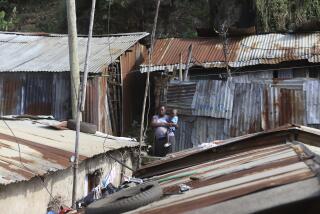‘Darkness of Torture and Repression’ : Independent Kenya at 25: Stability at a Price
- Share via
NAIROBI, Kenya — Kenya celebrates 25 years of independence this month, its famous game parks full of tourists, its economy growing and towering new buildings rising along the capital’s broad, tree-lined avenues.
But while the East African nation often is singled out as an economic example for the rest of impoverished Africa, some Western observers have become increasingly concerned about its human rights record under the authoritarian rule of President Daniel Arap Moi.
Moi has ruled Kenya for 10 years under the slogan of Nyayo , a Swahili word meaning footsteps. Banners and signs praising the president and carrying the slogan adorn buildings and roads throughout the country.
Leader of Struggle
The footsteps to be followed were originally those of Jomo Kenyatta, a leader of the struggle against British rule who became the country’s first president in 1964, a year after independence. He held the post until his death in 1978.
Today, however, the footsteps to be followed are clearly Moi’s.
Moi is firmly anti-communist, has no apparent affinity for Africa’s military rulers and follows generally conservative economic policies--all of which has won him favor in Washington. But his style of governing is iron-fisted and his word is law.
Dissent is little tolerated. Opposition political parties are banned by law, and the parliament routinely endorses government initiatives with little or no debate.
The government owns the country’s only radio and television stations and one of the three leading newspapers in Nairobi. There is no official censorship, but even independent newspapers dare not attack Moi’s policies.
Only Criticism
Virtually the only internal criticism of the government these days comes from some clergymen and attorneys. Even this is generally couched in terms gentle enough not to anger the president.
Parliament this year adopted a constitutional amendment that gives Moi the right to dismiss judges, a move some lawyers criticized as eroding the court’s independence. Another amendment empowering police to hold suspects in capital crimes for up to 14 days without charge also drew criticism.
About 100 people are serving prison terms after being convicted of having links with three clandestine organizations purportedly plotting to overthrow Moi’s government. Many of those convictions were based on what critics called tainted confessions.
It is the continuing crackdown against dissidents, which began about three years ago, that has brought the strongest condemnation from civil rights groups and individuals outside Kenya.
Amnesty International
The London-based Amnesty International human rights group has accused Moi’s government of subjecting dissidents to torture, phony trials and disappearances for “prolonged periods in unacknowledged and unlawful custody.”
Sen. Edward F. Kennedy last month urged the Kenyan government to “pull back from darkness of torture and repression and return to the bright sunlight of freedom, tolerance and the rule of law.”
“Will Kenya go forward with its campaign of intimidation and fear?” asked the Democrat from Massachusetts.
The words were perhaps the harshest criticism of Moi’s policies yet voiced in the United States. They came at a Washington ceremony in which the 1988 Robert F. Kennedy Human Rights Award was bestowed in absentia on a Kenyan lawyer barred from leaving his country.
Remarks Ignored
Moi has called Amnesty International an “agent of imperialists” but has so far ignored Kennedy’s remarks. The government has consistently denied torture allegations, and several prison guards and police officers have been charged in recent months with mistreating civilians.
The 64-year-old Moi, who seems to enjoy widespread popularity among his people, makes no apologies for the crackdown against dissidents.
“My responsibility is to defend a majority of peace-loving Kenyans,” he has said repeatedly.
With dissent stifled, Kenya enjoys a political stability little known in many parts of a continent torn by civil wars and tribal conflicts. And while massive poverty still exists in large parts of the country, its economy is nevertheless the envy of many of its neighbors.
Tourists, lured by Kenya’s Indian Ocean beaches and the elephants, lions, rhinos and other exotic animals that roam its national parks, pumped nearly $350 million into the economy last year. That ranked second only to agriculture, which not only fed the nation’s burgeoning population but exported nearly half a billion dollars worth of coffee, tea and other commodities.
Warning Flags
But warning flags are flying for the economy.
Slightly smaller than the state of Texas, Kenya has a population of 22 million that is growing at a rate of 3.8% a year, one of the highest in the world.
By the turn of the century, the population is forecast to be 35 million, possibly outstripping the country’s ability to feed itself.
Only 20% of Kenya’s mostly arid land is tillable, and that portion already is severely overcrowded.
More to Read
Sign up for Essential California
The most important California stories and recommendations in your inbox every morning.
You may occasionally receive promotional content from the Los Angeles Times.












